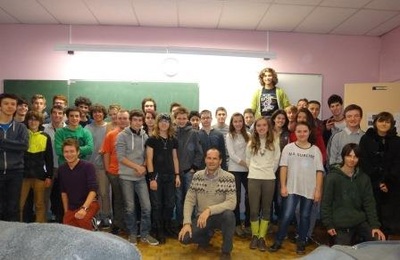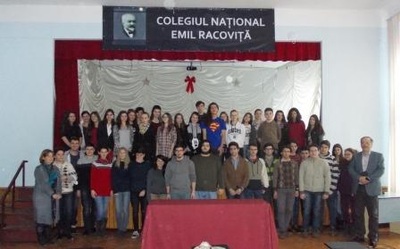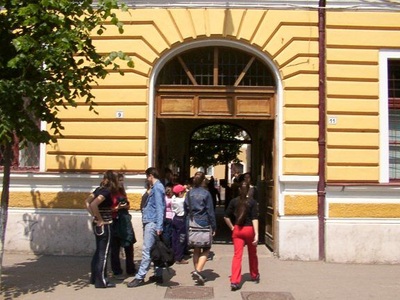MatLan project - awarded by the Public at Journée Académique Pédagogique 2016
About the project
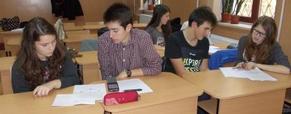
MatLan adds onto the MeJ experience a series of new dimensions:
- the assessment dimension: we will create guidelines for assessing students' skills (soft skills and mathematical competences) developed through mathematical research within the MeJ workshops;
- the inter-cultural dimension: we will encourage the inter-cultural exchanges around mathematical issues;
- the multilingualism/ plurilinguism dimension: we will create opportunities for the students’ language learning through collaboration within mathematical research activities;
- the formal education dimension: we will prove and promote a possibility for including the MeJ workshop (non-formal education) into the school's curriculum (formal education).
- the assessment dimension: we will create guidelines for assessing students' skills (soft skills and mathematical competences) developed through mathematical research within the MeJ workshops;
- the inter-cultural dimension: we will encourage the inter-cultural exchanges around mathematical issues;
- the multilingualism/ plurilinguism dimension: we will create opportunities for the students’ language learning through collaboration within mathematical research activities;
- the formal education dimension: we will prove and promote a possibility for including the MeJ workshop (non-formal education) into the school's curriculum (formal education).
The objectives of the project
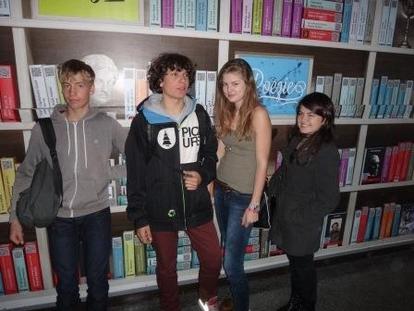
The objectives of the project are:
- to provide opportunities for high-school students to develop their mathematical skills through conducting mathematical research and collaboration with students from an EU country;
- to improve language learning (French language in Romania and English/ Romanian language in France);
- to create guidelines for assessing students' skills (soft skills and mathematical competences) developed through mathematical research conducted within the MeJ workshop;
- to include the MeJ workshop into the school's curricular provision as an elective course;
- to provide opportunities for mathematics and language teachers to share experiences and practices of supporting students in learning mathematics and languages and to collaborate with European colleagues to improve their teaching practices.
- to provide opportunities for high-school students to develop their mathematical skills through conducting mathematical research and collaboration with students from an EU country;
- to improve language learning (French language in Romania and English/ Romanian language in France);
- to create guidelines for assessing students' skills (soft skills and mathematical competences) developed through mathematical research conducted within the MeJ workshop;
- to include the MeJ workshop into the school's curricular provision as an elective course;
- to provide opportunities for mathematics and language teachers to share experiences and practices of supporting students in learning mathematics and languages and to collaborate with European colleagues to improve their teaching practices.
Partners
Colegiul National Emil Racoviță Cluj-Napoca, Romania and Lycée d'Altitude de Briançon work together for developing this project.
Should you have any questions or comments, please don't hesitate to contact the project coordinator.
Expected results
The expected results of the project are:
- the participating students’ enhanced research skills, foreign language skills, soft skills and intercultural competences;
- a set of assessment tools and procedures of mathematical and soft skills and guidelines for teachers who use the assessment tools and procedures;
- a jointly developed elective course curriculum for secondary schools (Doing Math as Researchers Do It);
- teachers’ improved action research skills;
- teachers’ improved collaboration with colleagues from the partner country;
- enhanced capacity of the schools to engage in European projects.
In the longer term, the expected impact is that more students will find mathematical research attractive and develop mathematical and soft skills while engaging in such research; teachers will be more innovative in their methods of teaching and assessing students’ skills; more young Europeans will choose a career in research; schools will adopt more attractive and innovative approaches to teaching/ learning; the formal education system will be better prepared to develop a broader set of soft skills in their students.
- the participating students’ enhanced research skills, foreign language skills, soft skills and intercultural competences;
- a set of assessment tools and procedures of mathematical and soft skills and guidelines for teachers who use the assessment tools and procedures;
- a jointly developed elective course curriculum for secondary schools (Doing Math as Researchers Do It);
- teachers’ improved action research skills;
- teachers’ improved collaboration with colleagues from the partner country;
- enhanced capacity of the schools to engage in European projects.
In the longer term, the expected impact is that more students will find mathematical research attractive and develop mathematical and soft skills while engaging in such research; teachers will be more innovative in their methods of teaching and assessing students’ skills; more young Europeans will choose a career in research; schools will adopt more attractive and innovative approaches to teaching/ learning; the formal education system will be better prepared to develop a broader set of soft skills in their students.

